Exclusive 3:16 Interview With Johann Gottlieb Fichte
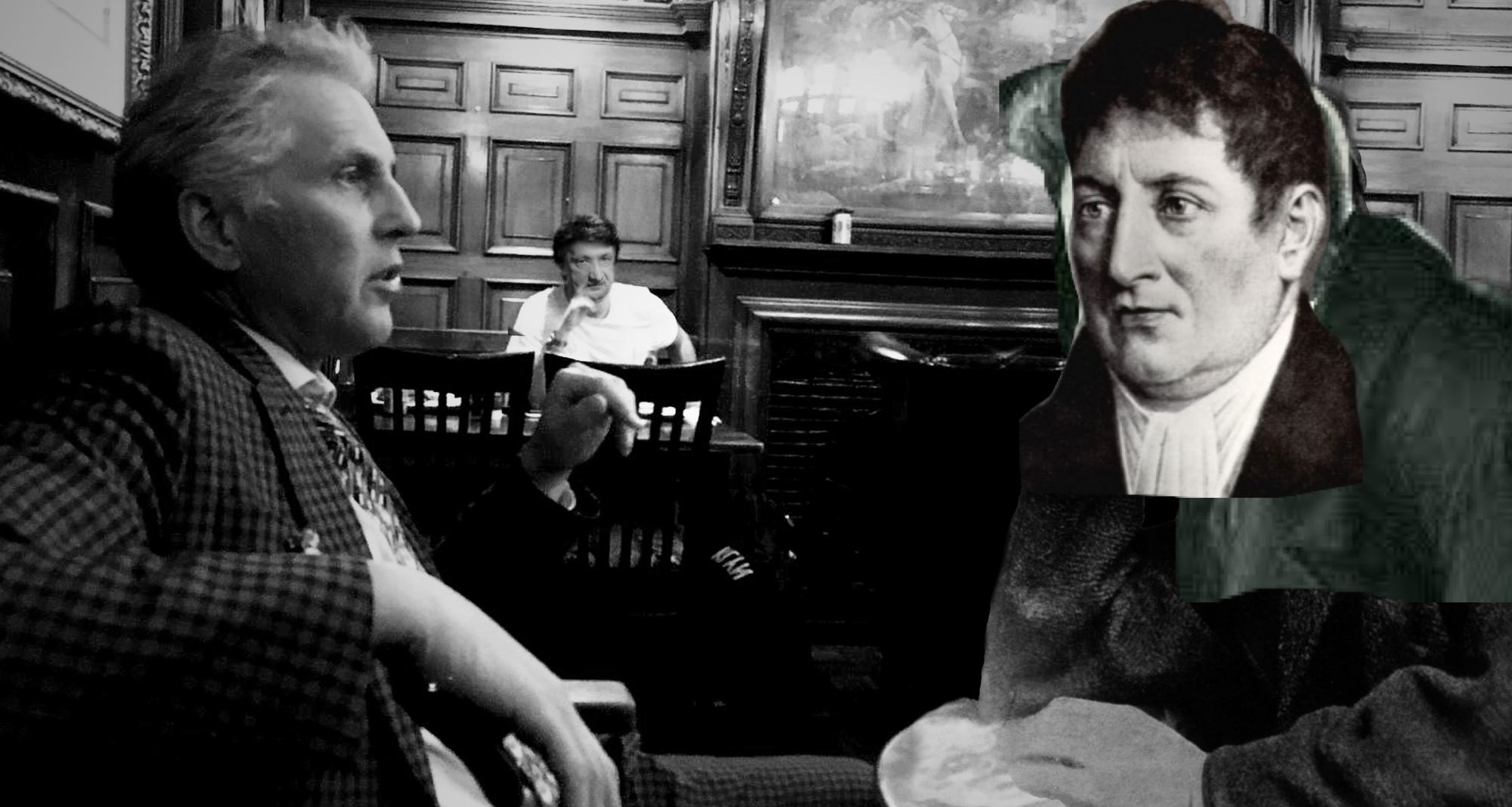
Interview by Richard Marshall
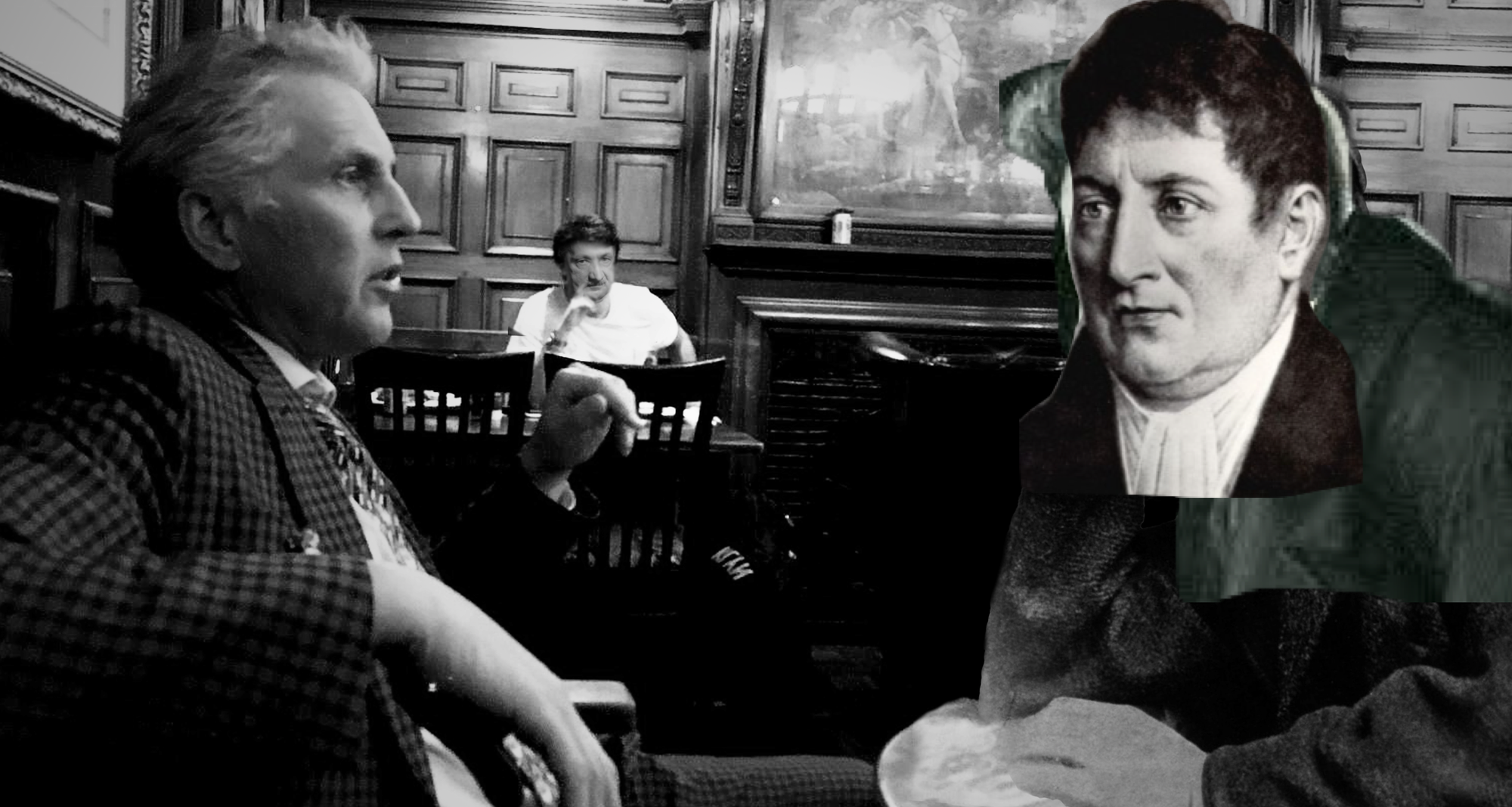
Inspired by his reading of Kant, Johann Gottlieb Fichte has developed a radically revised and rigorously systematic version of transcendental idealism, which he called Wissenschaftslehre or “Doctrine of Scientific Knowledge.” Perhaps the most characteristic, as well as most controversial, feature of the Wissenschaftslehre is Fichte’s effort to ground his entire system upon the bare concept of subjectivity, or, as Fichte expresses it, the “pure I.” During his career at the University of Jena Fichte has erected upon this foundation an elaborate transcendental system that embraces the philosophy of science, ethics, philosophy of law or “right.” and philosophy of religion. In this interview he discusses the Wissenschaftslehre.
3:16: What made you become a philosopher?
Johann Gottlieb Fichte: Well Richard, what sort of philosophy one chooses depends on what sort of man one is; for a philosophical system is not a dead piece of furniture that we can reject or accept as we wish; it is rather a thing animated by the soul of the person who holds it. By philosophy the mind of man comes to itself, and from henceforth rests on itself without foreign aid, and is completely master of itself, as the dancer of his feet, or the boxer of his hands.
3:16: So what are you trying to accomplish?
JF: I want to display the foundation of our experience, to explain the basis of the system of representations accompanied by a feeling of necessity. Whatever I find to be truth, whatever it may be, I shall welcome. I want to know. With the same certainty that I count on this ground to support me if I step on it, that this fire would burn me if I approach it, I want to be able to count on what I am and what I will be become. And if one should not be able to do this, I want to know at least that one cannot: And I want to subject myself to this outcome of the investigation, if it turns out to be true to me.
3:16: What do you take philosophy to be?
JF: Philosophy is a science. All descriptions of philosophy are as unanimous on this point as they differ from another regarding the object of this science.
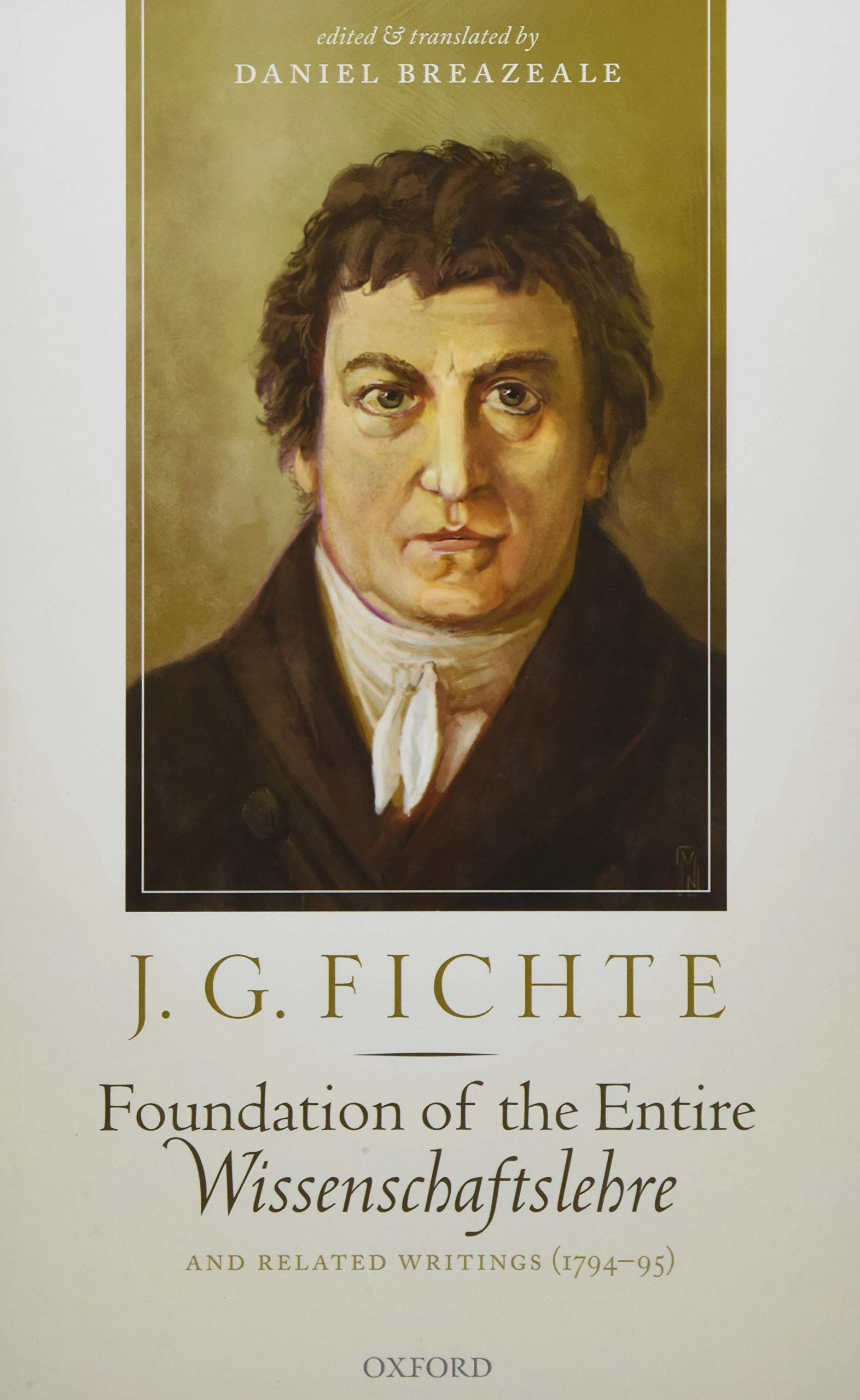
3:16: Well that just pushes us back a step. What is the science of philosophy then?
JF: Science possesses systematic form but is this enough to exhaust the concept of science Richard? Suppose someone affirms a groundless and indemonstrable proposition and suppose they were to erect an ever so systematic natural history on it. Would we consider such a system to be a science no matter how strictly inferences are made within it? Why do we refuse to call the system grounded on an unproven and unprovable proposition a science? And why do true cognitions not connected with a system count as science?
Science lies in the character of its content which must be certain, something he can know. A proposition that is certain cannot derive its certainty merely from its connection with other propositions that constitute a systematic whole. In each science there can only be one proposition that is certain and agreed upon prior to the connection between the propositions that constitute the science. Upon what do we propose to erect the foundation of our scientific structure?
The foundational principles of our system should and must be certain in advance. The certainty cannot be demonstrated within the system itself, since every proof that is possible within this system presupposes the certainty of these foundational principles. So, how can the certainty of the foundational principle itself be established? And what is the warrant for the special kind of inference by which we infer the certainty of other propositions from the certainty of the foundational principle? The inner content. The way in which this inner content is supposed to be communicated from this foundational principle to the other propositions is the form of that science. The question therefore is this: How are the form and content of a science possible in the first place? In other words , how is science possible?
3:16: So that’s what your philosophy is up to – trying to answer that?
JF: Yes, under the familiar name of philosophy one discovers the idea of a science, whether or not this is precisely what people have previously meant by the word ‘philosophy.’ Afterwards, if philosophy ever becomes a science it will be justified in shedding a few of the names it previously assumed out of a by no means exaggerated modesty – ‘esoteric amusement’, ‘hobby’, and ‘dilettantism.’What was previously called ‘philosophy’ would therefore be called ‘the science of science as such.’
3:16: Is what you’re doing, this science of science as such, metaphysics?
JF: One can philosophise about metaphysics itself, which need not be a doctrine of alleged “things in themselves”, but may instead be a genetic derivation of what appears in our consciousness. One may investigate the possibility , the real meaning, and the rules governing such a science, which is very advantageous for the cultivation of the science of metaphysics itself. The philosophical name for a system of such inquiries is ‘critique’. This, anyway, is all that ought to go by that name. Critique itself is not metaphysics, but lies beyond metaphysics.
3:16: What do you mean by that?
JF: Critique is related to metaphysics in precisely the same way that metaphysics is related to the ordinary standpoint of natural understanding. Metaphysics explains the ordinary standpoint, and metaphysics is itself explained by critique. Genuine critique criticizes philosophical thinking. If philosophy itself is also supposed to be called ‘critical’ this can only mean that it critisises natural thinking – a pure critique is intermixed with no metaphysical investigations.
3:16: Why do you think that the foundational principle would have to contain all possible content?
JF: To know with certainty means to obtain insight into the inseperability of a particular content and a particular form. From this it follows that from the way in which the absolutely first foundational principle of all knowledge determines its form purely and simply through its content and determines its content purely and simply through its form we can already see how the form of the entire content of knowledge might be determined – if, that is, this foundational principle includes all possible content. If there is one absolutely first foundational principle of all knowledge it would follow that its content would have to contain within itself all possible content and would itself be contained in no other proposition.
3:16: Do we have to assume there is such a principle?
JF: Well, whenever we presuppose the possibility of its foundational principle we are always already presupposing that human knowledge actually does constitute a system.
3:16: But what if there isn’t one?
JF: Then only two possibilities are conceivable. The first is that nothing whatsoever is immediately certain and that our knowledge consists of one or more infinite chains. You know, we build our dwellings upon the earth. The earth rests upon an elephant. The elephant stands upon a tortoise. The tortoise? Who knows what its standing on. Ad infinitum. Or, in the second case, our knowledge would consist of several finite series, each ending in a foundational principle based only upon its self. There would be several such foundational principles completely isolated from and unconnected with each other since each grounds itself purely and simply and independently of the others. If this is the actual state of our knowledge, if human knowledge is in itself and essentially such a piecework(as is the actual knowledge of many human beings) which neither have nor can have any point of connection then we are once again in no position to struggle against our own nature. Our knowledge would be certain but it wouldn’t be unified. It would constitute many sciences. It would not be a unified coherent structure.
3:16: Why would this be a bad thing? It seems like the sort of approach to ontology you get with the so-called New Realists – realms of sense that can’t be unified.
JF: It would be a dwelling in which we would always be lost and one could never feel at home. It would contain no light and we would remain poor despite all our wealth because we would never be able to make an estimate of our wealth, consider it as a whole, and know what we actually possess. Furthermore our knowledge would never be complete. Every day we would have to anticipate that a new innate truth might express itself within us, or that experience might present us with a new simple property.
3:16: So you’re saying that we need one unified system of knowledge?
FS: Yes. And if so, then there must be such a supreme and absolute first foundational principle. Though our knowledge might radiate from this foundational principle in ever so many lines all these lines must cohere in one single ring which is itself attached to nothing but, through its own power, supports itself along with an entire system of knowledge. Here we have a planet that supports itself through its own gravity and irresistibly attracts towards its centre anything that is actually built perpendicular to and upon its surface and not, as it were, aslant and hanging in the air.
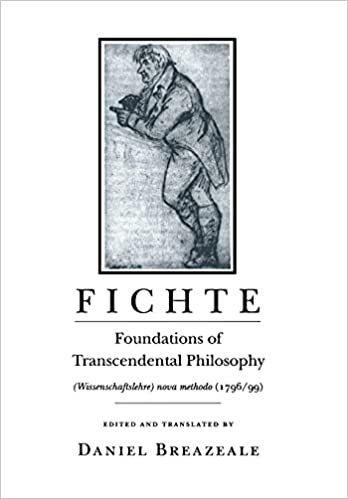
3:16: So is that the kind of thing Kant was up to?
FS: Well, the Kantian critique is by no means a pure critique but consists largely of metaphysics. Sometimes it critisises philosophical thinking and sometimes it criticises natural thinking – which, taken by itself, would be no cause for reproach, if only the distinction between the two kinds of critique had been clearly indicated, as well as the kind of critique to which each of the individual investigations belonged. A pure metaphysics includes no additional critique beyond the critique that is supposed to be settled in advance.
3:16: And of course Kant’s an important influence for you isn’t he? Do you agree with his Copernican turn?
GF: If by that you mean his argument that the cognitive object shall be posited and determined by the cognitive faculty, and not the cognitive faculty by the object, then yes. Look, Kant’s philosophy is correct as such – but only with respect to its results, not its reasons. This singular thinker looks more marvelous to me every day. I believe he possesses a genius that reveals to him the truth without showing him why its true. In short, I believe that in a few more years we shall have a philosophy that will be just as self evident as geometry.
3:16: Kant and Kantians often rely on “representation” (Vorstellung) to refer, as Heidegger suggests, to what is present in its absence, in short reality. You use the term differently don’t you?
JF: I say the system of representations accompanied by the feeling of necessity is also called experience. For me, representation is related to the object as an effect to its cause, and to the subject as an accident to its substance.
3:16: So where according to Kant, the subject, or “I think” that “must be able to accompany all my representations” is a “pure apperception,” not “an empirical one, you approach the cognitive problem to begin with through finite human beings in a social context don’t you?
JF: Yes. Our task is to discover the primordial, absolutely unconditioned first axiom of all human knowledge. This can be neither proved nor defined, if it is to be an absolutely primary axiom.
3:16: You disagree with his idea of the ‘thing in itself ‘don’t you, and also with his view about philosophical intuitions?
JF: The immediate consciousness of a nonsensuous entity is a concept perfectly absurd. The intellectual intuition alluded to in my science of all science refers, not to existence at all, but rather to action, and simply finds no mention in Kant (unless, perhaps, under the title of ‘pure apperception’). My intellectual intuition is pure apperception. Only through blind Instinct, in which the only possible guidance of the Imperative is wanting, does the Power in Intuition remain undetermined; where it is schematised as absolute it becomes infinite; and where it is presented in a determinate form, as a principle, it becomes at least manifold. By the above-mentioned act of Intelligising, the Power liberates itself from Instinct, to direct itself towards Unity.
3:16: You think Kantianism leads to skepticism don’t you?
JF: Yes. Kantianism absolves me of all dependence by transforming me and everything around me on which I might be dependent into nothing. You do away with necessity by doing away with and annihilating all being. For Kant there is no being. There are images, images which drift by, without there being anything by which they drift, images which do not represent anything, without meaning and purpose. All reality is transformed into a fabulous dream, without there being any life the dream is about. What we have to ask is: what is it that lies beyond all representations? Well Richard, one cannot live under the open sky. It cannot be helped: the system has to be rebuilt. There is no further room for investigation beyond Kant’s spirit. I am completely convinced that he laid the foundation of his own investigations, albeit obscurely, the same foundational principles that I wish to establish clearly and determinately. I do, however, hope to go beyond the letter of Kant’s writings.
3:16: Why do you think Kant didn’t see that representation was more powerful than intuition and understanding?
JF: I think he appears to have philosophized far too little about his own philosophizing.
3:16: So what does lie beyond all these representations?
JF: Ah Richard, something which is more and higher than all knowledge and that contains the final purpose of knowledge within itself. A drive to absolute independent self-activity which can ultimately serve as the point where consciousness connects with reality. It is only through the medium of the moral law that we can do this.
3:16: To help us, can you give us a brief blueprint of what you propose to rebuild Kant?
JF: Sure. Firstly, if in intellectual intuition, the I is because it is and is what it is, then it is, to that extent, self positing, absolutely independent and autonomous.
3:16: But of course that isn’t the case when we’re conscious of some fact is it?
JF: Exactly. The I that is present in empirical consciousness, the I as intellect, is only in relation to something intelligible, and is, to that extent , dependent. But the I that is thereby posited in opposition to itself is supposed to be not two but one – which is impossible, for dependence contradicts independence.
3:16: So how do you deal with this inconsistency? It seems pretty fatal to the whole approach.
JF: Well, Richard, since, however, the I cannot relinquish its absolute independence , this engenders a striving.
3:16: A striving?
JF: Yes Richard. The I strives to make what is intelligible dependent upon itself in order thereby to bring the I that entertains representations of what is intelligible into harmony with the self-positing.
3:16: So is this why you emphasise practical reason over theoretical?
JF: Well done Richard. This is what it means to say that reason is practical. In the pure I, reason is not practical; nor is reason practical in the I as intellect. Reason is practical only insofar as it strives to unify these two.
3:16: So practical reason isn’t subservient to theoretical reason in your theory?
JF: Quite. Far from practical reason having to recognize the superiority of theoretical reason, the entire existence of practical reason is founded on the conflict between the self-determining element within us and the theoretical-knowing element, and practical reason itself would be abolished were this conflict to be eliminated.
3:16: So you think theoretical philosophy cannot justify its own fundamental principle, and that it must be grounded on a practical belief that is not knowledge?
JF: What you call ‘belief’ I explain in terms of the voluntary acquiescence in the view that naturally presents itself to us. It’s not knowledge but a decision of the will to recognize the validity of knowledge, not knowledge, but a decision of the will to admit the validity of knowledge. No knowledge can be its own foundation and proof because belief first gives approval to knowledge and so every supposed truth, which is to be produced by mere thinking without having its roots in belief, will surely be false and fallacious. Think of it as a summons. We do not act because we know, but we know because we are called upon to act; the practical reason is the root of all reason.
3:16: So why do you think all knowledge claims depend on practical motives and beliefs? Usually knowledge is seen as more fundamental than beliefs but you reverse this don’t you. Why?
JF: They’re more and higher than all knowledge Richard. This voice within me leads me outside of mental representations, out of mere knowledge, to something which is more and higher than all knowledge and contains the final purpose of knowledge itself within it.
3:16: Is the distinction between beliefs and knowledge just a verbal distinction?
JF: That’s mere nihilism speaking Richard. It’s no mere verbal distinction but a true deeply founded distinction of the most important consequence. Imagination produces reality; but there is no reality therein; only through apprehension and conception in the understanding does its product become something real. Every opposite so far as it is so, is so absolutely, by virtue of an act of the I, and for no other reason. Opposition in general is posited absolutely by the I. But that everything, wherein this X may be, is not that which presents, but an item to be presented, is something that no object can teach me; for merely in order to set up something as an object, I have to know this already; hence it must lie initially in myself, the presenter, in advance of any possible experience.
3:16: Jacobi accuses your position as being fatalistic because it appears to say that we are determined to choose to believe in knowledge.
JF: He’s confused Richard. It is not these empty images of things supposedly existing outside ourselves but the necessary belief in our freedom and strength, in the reality of our acting that justifies all consciousness of a reality existing outside of us—a consciousness which itself is only a belief since it is based on belief, but a belief that necessarily follows from consciousness. This is suitable to our dignity and vocation. This voluntary acquiescence in the view that naturally presents itself to us, because only on this view can we fulfil our vocation, first gives approval to knowledge and raises to certainty and conviction what without it would be mere deception. All my conviction is only belief; and it proceeds from my disposition.
3:16: So you’re optimistic about this sense of prudential belief in the efficacy of rational action creating not only a better, but maybe even a utopian world?

JF: That purpose has got to be achieved. Oh, it is achievable in life and through life, for reason commands me to live. It is achievable, for—I am!
3:16: Wow. Ok. What’s Conscience got to do with this?
JF: Conscience is the immediate consciousness of that without which there is no consciousness: the consciousness of our higher nature and of our absolute freedom. It’s our consciousness of our determinate duties, a conviction accompanied by the subjective feeling of certainty.
3:16: So our duties are clear because we’re who we are and we have to follow them because of being who we are? Is this conviction duties carry objective?
JF: I have the feeling of certainty that there is a compete harmony of my empirical I with the pure I. For the sake of conscience, every human being must judge for himself and must compare his judgment to his own feeling: otherwise he acts immorally and unconscionably. Only through commandments of conscience do truth and reality come into my representations. I cannot refuse them my attention and my obedience without giving up my vocation.
3:16: So does this mean that whereas we can doubt theoretical knowledge our moral knowledge can’t be doubted?
JF: Yes Richard. We raise ourselves out of this nothingness and maintain ourselves above this nothingness only through our morality. Conscience alone is the root of all truth, or alternatively, truth has its origin in conscience alone. There are two great classes of men Richard: the people and the scholars, the men of science. For the former, nothing exists but that which directly leads to action. It is for the latter to see beyond. They are the free artists who create the future and its history, the conscious architects of the world.
3:16: So this conviction or belief constitutes the truth about ourselves?
JF: Let me put it like this for you Richard: I can’t refuse to believe in the reality which the commandments of conscience bring along without likewise denying my vocation. It is simply true, without further testing and justification, it is the first truth and the ground of all other truth and certainty, that I ought to obey that voice.
3:16: And is it because of this that we can dispel the threats of solipsism and nihilism because there have to be other beings like us out there?
JF: Quite right Richard. You’re getting there! Our conviction concerning our own moral determination or vocation is itself already the result of a moral disposition and is a matter of belief and belief is the element of all certainty. Your vocation is not merely to know but to act according to your knowledge. And let’s face it, the person who doubts there is an external world does not need proof: he needs a cure.
3:16: So what’s the content of this belief?
JF: What grounds all consciousness of a reality outside ourselves is the necessary belief in our freedom and power to act, in our actual acting and in the determinate laws of human acting. Such consciousness is itself only a belief, since it is grounded on a belief in our own acting, but it is a belief that necessarily follows from the latter belief. In this sense, the necessary belief is clearly different from discursive or logico-deductive knowledge. For the former has something to do with a decision of the will to admit the validity of knowledge. Belief then implies a firmness of my confidence, that is reason’s firm and unshakable adherence to a principle.
3:16: So is it fair to say that your transcendental idealism purports to give an account for all experience strictly in terms of subjective states and autonomous intellectual activities?
JF: The consciousness of a thing outside of us is absolutely nothing more than the product of our own representational capacity in what we call knowledge and observation of things we always and ever only know and observe ourselves, and in all our consciousness we simply know of nothing other than ourselves and our own determinations. Everything which occurs in our mind can be completely explained and comprehended on the basis of the mind itself.
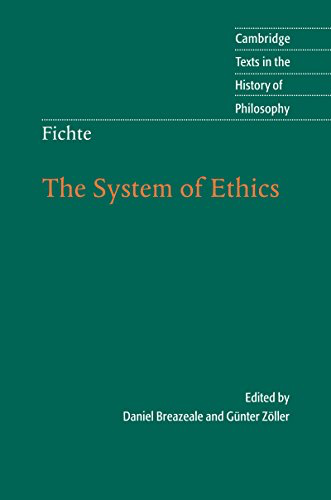
3:16: Why isn’t this a version of Spinoza’s idea of rational theism which looks deterministic and mechanistic to many? You don’t want those things do you?
JF: Belief must be seen as the core element of a religion that is based in reason alone especially since the true belief in the moral world order is constituted by right action.
3:16: But why doesn’t that mean we are mechanistically determined by reason?
JF: Richard, can I will, without having something which I will? No:--this would entirely contradict the nature of my mind. I ought to carry out the act which is the means to this purpose and only to it.
3:16: But then couldn’t the end condition every action we take?
JF: Richard , pay attention: to every action there is united in my thought, immediately and by the laws of thought itself, a condition of things placed in futurity, to which my action is related as the efficient cause to the effect produced. Accordingly, the end does not determine the commandment; but, on the contrary, the primitive purport of the commandment determines the end. I live in obedience to conscience or belief. I live also in the intuition of its purpose; I live in the better world which it promises to me.
3:16: If belief doesn’t express ordinary discursive knowledge doesn’t it end up being random, irrational and arbitrary?
JF: Well of course you’re right Richard to say that the decision of the will to recognize the validity of knowledge is a voluntary acquiescence in the view which naturally presents itself to us because only on this view can we fulfill our vocation. But because we are all born in belief we can act in accordance to our will, rather than, by nature. The world is nothing more than our own inner acting qua pure intellect, made visible to the senses in accordance with comprehensible laws of reason and limited by incomprehensible boundaries within which we simply find ourselves to be confined. Granted, the origin of these boundaries is incomprehensible; but, replies practical philosophy, nothing is clearer or more certain than the meaning of these boundaries: They constitute your determinate place in the moral order of things.
3:16: So some metaphysical claims are being made here aren’t they?
JF: Of course. Free spirits alone are real . An independent, sensible world through which they might act upon each other is quite unthinkable. The whole final purpose of reason is its own pure activity. If I am to be able to recognize that obedience as rational, if it really is to be reason which forms my being, and not an extravagant fancy of own invention or dragged in from somewhere or other then this obedience to the imperative of autonomous activity must have some outcome or serve some purpose. Evidently it does not serve the purpose of the natural earthly world. There must, therefore, be a supernatural world whose purpose it serves.
3:16: And this metaphysical belief can’t be justified on epistemic grounds can it?
JF: Human knowledge is an act which does not and cannot appear among the empirical states of our consciousness, but rather lies at the basis of all consciousness and alone makes it possible. Knowledge produced without belief is surely false and fallacious, since bare and pure knowledge leads only to the insight that we can know nothing. I know that such false knowledge never can discover anything other than what by faith it has first put into its premises. We do not act because we know, but we know because we are meant to act. Practical reason is the root of all reason.
3:16: But doesn’t that open you to the criticism that Schelling puts to you: ‘ought you really to be of the opinion that there is light only so that rational beings when they talk to one another can also see each other, and there is air solely so that when they hear each other they can also speak to one another?’ You seem to have an analysis of nature that is purely teleological in nature – it’s there solely for us? It gets things the wrong way round surely?
JF: I say all being is only in relation to knowing. He replies to me: no, all knowing is only a kind of being.
3:16: But you do seem to emphasise epistemology over ontology, and that’s Schelling’s point here isn’t it? And isn’t it a key issue regarding this distinction of the finite self being deduced from the concept of the absolute self. So does this absolute self , the absolute I, exist?
JF: Yes. It’s an essential component of the ‘one-in-many’ of self-consciousness. The Urform of the I is that of the pure eternal being. My absolute self is clearly not the individual. But the individual must be deduced from the absolute self. The I posits itself as an I. What I mean is: think the I, and observe what is involved in doing this. After all Richard: what doesn’t exist cannot posit! And no object comes to consciousness except under the condition that I am aware of myself, the conscious subject.
3:16: But at times you do sound as if the absolute I is something that ought to exist rather than actually does. It all sounds a bit one-sidedly subjective.
JF: The absolute I is the formal limit of thinking Richard.
3:16: So you’re not positing an Absolute I, neither are you suggesting that the I creates the I ?
JF: Quite. It is the practical power that is the innermost root of the I and our freedom itself is a theoretical determining principle of our world.
3:16: Well I’m still not sure how something that doesn’t exist can have a formal role, or any kind of role actually!
JF: Determinations of consciousness are either accompanied by a feeling of freedom and depend merely on our free choice or are accompanied by a feeling of necessity. The first come from imagination and our will. The second are cognitions and appear to us as depending on something that exists independently of our own efforts and the necessity marks the objectivity or referential character of consciousness. Experience is the system of representations accompanied by a feeling of necessity.
If you reflect on the concept of the I, think of yourself and notice how you do it . You will find that in the thinking of this concept his activity as an intelligence reverts into itself and makes itself its own object. Intellectual intuition is the immediate consciousness that I act and of what I do when I act. The I posits itself absolutely. The I posits itself in opposition to a not-I. The I posits a limited I in opposition to a limited not-I The I posits the I and not-I as mutually determining each other. The third principle expresses the first and fundamental synthesis that if further synthetic a priori propositions are to be possible, then they must already be implicitly contained in the first synthesis.
3:16: Wow! So the act and the product of that act are the same?
JF: Yes. The I posits itself. It is at once the agent and the product of action; the active, and what the activity brings about. I posit the I as the highest concept, to which the Not-I is posited in opposition. The Not-I cannot be posited in opposition to the I unless this NOT-I is posited within the highest thing we can conceive of – the absolute I. This latter I is supposed to be equivalent to the Not-I in the sense that they are both posited in the absolute I and at the same time and in the same respect posited in opposition to the Not-I. This is conceivable only if the I includes some third element in terms of which the I and Not-I would be equivalent and this is the concept of quantity. But if the I is supposed to be absolute , determined purely by itself then if it is determined by the Not-I then it isn’t self determined – which contradicts the highest and absolutely first foundational principle.
3:16: The relationship between the limited I and not-I is unstable isn’t it?
JF: It hovers above or oscillates between them.
3:16: And it’s this hovering between subject and object that produces representations?
JF: Yes, it is this hovering or oscillating of the power of the imagination between components that cannot be united, this conflict of the power of the imagination with itself, that extends the state of the I in this oscillation and conflict to a moment in time. For pure reason alone everything is simultaneous; time exists only for the power of the imagination. The power of the imagination does not sustain this oscillation for long, for no longer than a moment – except in a feeling of the sublime, in which there arises astonishment and in which the reciprocal-acting-and-being-passively-affected in time comes to a standstill. But the mind abides in this conflict and oscillates between the demand and the impossibility of fulfilling it. In this way, that is, by coming into contact with these components, again being driven away from them, and then again coming into contact with them, the mind endows them with a certain content in relation to itself as well as with a certain extension. The name for this state of mind is intuiting. The power acting in this state is the imagination.
3:16: So are you saying that reality is generated by the imagination?
JF: All reality – reality for us – since reality cannot be understood in any other way in a system of transcendental philosophy – is generated by the imagination, yes Richard.
3:16: But then isn’t what we think is reality an illusion, a deception?
JF: Every deception must posit truth in opposition to itself; it must be possible to avoid deception. When it has been proven that the possibility of consciousness, of our life, and of our being for ourselves, is based upon this power of imagination, then this action cannot be eliminated. This action on the part of the power of the imagination does not deceive us but provides us with truth and the only possible truth. To assume that it deceives us is to establish a skepticism that teaches us to doubt one’s own being!
3:16: Ok, so what exactly is the produced by the power of the imagination?
JF: The product of the power of the imagination in its oscillation must lie between the powers of reason and imagination. This is the power by means of which what is changeable endures and becomes understandable. This power is therefore rightly called the power of understanding. It is a dormant inactive power of the mind, the mere receptacle for what is produced by the power of the imagination and for what is determined or remains to be determined by the power of reason. Only in the understanding is there reality; it is the power of what is actual; it is in the understanding that what is ideal becomes real. The power of the imagination produces reality, but there is in it no reality. The product of the power of the imagination becomes real only when it is apprehended and comprehended by the power of understanding.
3:16: So are you saying that because we don’t notice the power of understanding we accept the reality of things existing?
JF: Exactly Richard. Were we, in ordinary reflection, able to become conscious of what we are conscious of in philosophical reflection then we would once again describe everything as deception and in doing so we would be just as incorrect as we were when we described things as existing outside of and without any assistance from ourselves.
3:16: To be fair, this is a bit obscure and seems very different in the end to Kant’s system doesn’t it – which is also pretty tough to read?
GF: Perhaps this will help you see the relationship between my system and Kant’s. Kant seeks to discover the basis for that unity of the manifold which is present in the Not-I. How do you unite A,B,C, etc… which are already given… into the unity of consciousness. I believe it need only be said to be understood that this question presupposes another: “How do you first arrive at A and B and C? They are given. In plain language this means , does it not, that you do not know?
3:16: OK.
JF: Very well then, either prove to me that and why you cannot know this, or else do not speak to me about philosophy as a science so long as you do not know it. At the proper time we will indeed inquire into how you may unite A and B etc. But A for itself and the subject are also distinct are they not?
3:16: They are.
JF: The first question is then how do you unite these? Once we know this the second subordinate question will be easy to answer. For you will undoubtedly assimilate B just as you assimilated A. And once A is within the subject and B is then assimilated into that same subject then it undoubtedly follows that B will join A. This makes my path much easier and shorter than Kant’s.

3:16: And you’ve come up with some surprises with this approach haven’t you?
JF: I have. One is that there is no A that is absorbed first, nor can there be. Instead however high one ascends something higher is always presupposed. For example, every intuition is necessarily posited in the present point in time, but there is no present point in time without a past one. Hence there is also no present intuition without a past intuition to which it is joined; and there is no first moment, no beginning of consciousness. This proves what Kant presupposed – that the not-I is necessarily manifold. This also indicates why that great thinker , who surely penetrated those very same depths I’m attempting to plumb, began his treatment of the not-I precisely at the point he did. We, however, should no longer allow the matter to rest there.
3:16: Doesn’t your whole system question-beg its conclusion about there being a foundational principle and a single unified system of knowledge?
JF: There is a circle here from which the human mind can never escape, and one does well to concede its presence explicitly in order to avoid being confused by its unexpected discovery at some later time. This circle is as follows: If proposition X is the first, supreme, and the absolute foundational principle of human knowledge, then there is only a single system of human knowledge for this is the conclusion that follows from proposition X. However, since human knowledge is supposed to constitute a single system it follows that proposition X, which according to the proposed science is actually the foundation of a system, is the foundational principle of human knowledge as such and that the system grounded upon X is the single system of human knowledge.
3:16: Well isn’t this a vicious circle?
JF: There is no reason to be embarrassed by this circle.
3:16: Really? It looks pretty embarrassing to me.
JF: Think Richard: to desire its abolition would be to desire that human knowledge should completely lack any foundation at all – that nothing should be purely and simply certain and that all human knowledge should instead be only conditional, that no proposition should be valid in itself, but instead, that every proposition should be valid only on the condition that the proposition which follows is valid. Whoever wishes to do so can always ask himself what he would know if his I were not an I – that is, if he did not exist and if he were unable to distinguish any Not-I from I.
3:16: Ok. What’s the relation of your doctrine of scientific knowledge to logic? Doesn’t logic establishes the form of all the possible sciences so it seems to be doing the same thing as your science of all science as such?
JF: Logic is supposed to furnish every science with nothing but its mere form whereas my science of all science is supposed to furnish them with content as well as form. My doctrine of scientific knowledge provides the foundation for logic. Prior to it, one may not presuppose the validity of a single proposition of logic, including the law of contradiction.
3:16: How do you separate your universal doctrine of scientific knowledge from each of the sciences that follow from it? After all, if everything’s already there in the foundational principle, what could the actual sciences add without violating the principle’s claim to universality? And if the individual science doesn’t add anything, how does it get distinguished from the foundational principle?
JF: The doctrine furnishes the foundational principle in question with necessity and freedom as such whereas the particular science in question would determine this freedom in a specific way. The principle furnishes us with a not-I which is purely and simply independent of the laws governing mere representations, just as it provides us with the laws governing how this Not-I should and must be observed, and it provides these necessarily. It also furnishes us with the laws according to which nature should and must be observed. But the power of judgment still retains its complete freedom to apply these laws to all or not apply them at all. Natural science consists of experiments and we conduct these voluntarily and nature may or may not correspond to them. In this manner natural science is distinguished from the principle of scientific knowledge.
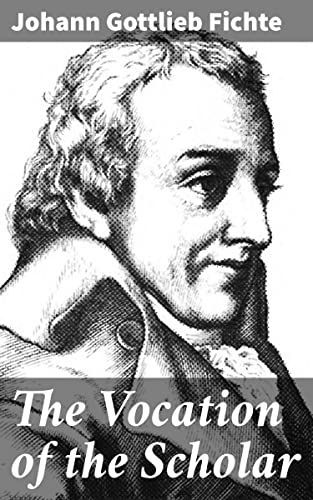
3:16: Now you say every proposition of the doctrine of scientific knowledge has form and content. It’s got to be about something – so what is it about? What’s its object?
JF: It’s about the system of human knowledge Richard. This exists independently of the science of the same. These are the ‘actions of the mind.’ These actions constitute what is present in advance. Every action occurs in a specific way, in accordance with a law and this law determines that action. If all the actions of the mind are interconnected and are subject to universal, specific and individual laws then they also present a system for any possible observer. These actions of the human mind constitute the whole material for the doctrine of scientific knowledge but not this science itself. Like all possible sciences it arises by means of a specific determination of freedom, in this case, the free action of raising to consciousness the manner in which the human mind as such acts. All that distinguishes the doctrine of scientific knowledge, my science of all sciences as such, from other sciences is this: the object of these other sciences is itself a free action whereas the object of the doctrine are necessary actions. By means of this free action something that in itself is already form – ie the necessary action of the human mind – is incorporated as content into a new form – the form of knowing or consciousness. The action is one of reflection and abstraction. It is impossible to reflect without having engaged in abstraction.
3:16: So how does the human mind know what it’s supposed to accept and ignore?
JF: This is something we simply cannot know. This activity is governed by no rule at all and there can be no such rule. The human mind makes various attempts. By blindly groping it succeeds in reaching the dawn and only then does it emerge into the bright light. If we had not begun with obscure feelings concerning things that we did not clearly recognize until later we would to this day still have no clear concepts and would still remain that lump of clay which first wrenched itself from the earth. This then is the history of philosophy!
3:16: If the entire doctrine of scientific knowledge, the science of science is an act of representing, then doesn’t that mean that everything reflected upon is also merely representation?
JF: No. The I is represented but from this it doesn’t follow that it is represented merely as representing – that is, merely as an intellect. Representing is the highest and absolutely first act of the philosopher as such but the absolutely first act of the human mind might well be something else. Something that does follow from what has been said is that we can become conscious of all the intellect’s manners of acting only in the form of representation, that is, only insofar as and in the manner that they are represented.
3:16: If I only come into being when conscious then what was I before that?
JF: The possibility of this question is based upon confusing the I as subject with the I as object of reflection on the part of the absolute subject and is in itself completely illegitimate. The I produces a representation of itself and in so doing assimilates itself into a form of representation, and only now is it something, an object. In this form consciousness obtains a substrate that exists, even without actual consciousness and is thought corporeal as well. When you ask “what was the I then? That is to say, what is the substrate of consciousness?” But in doing this one also thinks, without noticing it, of the absolute subject, as intuiting this substrate. In doing so one tacitly adds in thought precisely that from which one professed to have abstracted and therefore contradicts oneself.
3:16: This seems close to the kind of thing Kant and before him Descartes were driving at?
JF: Yes, Kant in his deduction of the categories gestured toward our proposition as the foundational principle of knowledge but he never established it determinately as a foundational principle. Before him Descartes had asserted something similar, cogito ergo sum, which need not be interpreted as the minor premise and conclusion of a syllogism, the major premise of which is ‘whatever thinks exists.’ Instead he may very well have considered this to have been an immediate fact of consciousness, in which case it means ‘I am a thinking subject, therefore I am, or, as he would have put it, ‘I am, therefore I am.’ But in this case the addition of cogitans is quite superfluous; it is not the case that if one exists then one necessarily thinks, but rather that one necessarily exists if one thinks.

3:16: So thinking’s not the essence of being?
JF: No. It is only a specific determination of its being, in addition to which there may be other determinations of our being.
3:16: Why don’t you go as far as Spinoza who agrees that the I does exist for the I but also asks what the I would be for something outside the I?
JF: Good question Richard. Such a being outside the I would have to be an I, of which the posited I (my I) along with all the I’s that could possibly be posited, would be modifications. He separates pure from empirical consciousness. He posits the former in God, who is never conscious of himself since pure consciousness never attains to consciousness, and he posits the latter in the particular modifications of the Deity. Set up like this his system is completely consistent and irrefutable, but his system is groundless, for what justifies his proceeding beyond the pure consciousness that is given in empirical consciousness?
He established merely an aspirational ideal which could never be achieved. In the science of science we rediscover Spinoza’s highest unity, not as something that exists but rather as something that ought to be but cannot be produced by us. If one oversteps the I am then one must necessarily arrive at Spinozism. And note that Salomon Maimon has shown that Leibniz’s system is nothing other than Spinozism and that there are only two fully consistent systems: the Critical System, which recognizes the limit, and the system of Spinoza, which oversteps it.
3:16: So because I am is a fundamental existential claim, not merely a formal claim, everything, including the Not-I, derives from it? Is that right?
JF: Yes. The purely formal, logical proposition “A=A” arose from the material proposition “I am” by means of abstraction from the content of the latter. The logical proposition “-A is not=A” is obtained by means of a similar abstraction from the material principle established by “I am not the Not-I”.
3:16: But if the Not-I is posited in the I then the I is not posited in the I, for the I is annulled by the Not-I. But you also say that the Not-I can only be posited insofar and as to the extent that there is posited an I to which the Not-I can be posited in opposition, so the I must be posited with the Not-I in the same consciousness. Isn’t this a contradiction? The first foundational principle, the I, and the second, the opposing Not-I, seem to both annul and not annul each other.
JF: Yes. We must therefore discover some X that will allow these inferences to be correct without nullifying the identity of consciousness. Both the opposites are supposed to be united within the I qua consciousness. Consequently X must also lie within I. I argue that there is an action of the human mind =Y, the product of which is X.
3:16: Ok, so how can A and -A, being and not being, reality and negation, be thought together in a manner that does not annihilate and annul them?
JF: A and –A will mutually limit each other. Therefore action Y would be an action of limiting each of these terms posited in opposition to one another, and X would designate those limits.
3:16: What do you mean by limits?
JF: To nullify its reality by means of negation, not entirely but only in part. The concept of a limit contains in addition to the concepts of reality and negation, that of divisibility, the category of quantifiability. Divisibility is the X, and Y is the action by means of which the I as well as the Not-I are purely and simply posited as divisible.
3:16: You claim that this answers Kant’s question: How are synthetic judgments possible a priori? Can you explain why you think this?
JF: Well Richard, we have achieved a synthesis of I and Not-I which are posited in opposition to each other by means of the posited divisibility of both. One cannot enquire any further. It is purely and simply possible and one is entitled to it without any further ground. All other syntheses that are supposed to be valid must be contained in this synthesis of the limited-I and the limited Not-I.
3:16: You conclude from this that humans are not animals don’t you? This seems odd given that natural science has shown that humans are animals.
JF: Well, insofar as a human being is an absolute and not a represented nor representable subject they have nothing whatsoever in common with a natural being and is therefore also not posited in opposition to such a being.
3:16: And what’s the relationship between human beings and freedom?
JF: Both concepts are supposed to be united. They cannot be united in any concept whatsoever however, but only in the Idea of an I whose consciousness is determined by nothing whatsoever outside itself, but instead itself determines everything outside itself by means of its own sheer consciousness. But such an Idea is itself unthinkable inasmuch as for us it harbors a contradiction. Nevertheless it is established as our supreme practical goal. A human being should infinitely approach unattainable freedom. For this reason Kant and his followers have quite correctly called such judgments that contain comparison to an ideal I can’t know, “infinite”.
3:16: Why shouldn’t we just do away with having grounds and deny that minds are systems?
JF: As we’ve noted before, such a philosophy must annul the unity of consciousness and logic as a whole.
3:16: Is yours an Idealism or a Realism?
JF: The task of the synthesis in part 2 of the science of science is no less than this: to indicate a middle pat between idealism and realism. Dogmatic realism and dogmatic idealism must be seen as one and the same. This occurs in the following way: by virtue of the principle of reciprocal positing that which is an activity in the Not-I is, in the I, a state of being passively affected. The ideal and the real ground are one and the same in the concept of causal efficacy. People do not wish to endorse this proposition, which grounds Critical Idealism and thereby unites idealism and realism. And the reason for their reluctance is their inability to engage in abstraction. Most human beings would rather consider themselves to be a piece of lava in the moon than an I. This is why they have not understood Kant and have no inkling of the spirit of his philosophy.
Critical Idealism is dogmatically opposed to dogmatic realism and dogmatic idealism. Regarding the question posed by Critical idealism – namely, what is the ground of the reciprocal relationship that has been assumed to exist between the I and Not-I – Critical idealism confesses its ignorance and indicates that inquiry into this ground lies beyond the boundaries of theory.
3:16: So what’s special about this kind of idealism?
JF: In the kind of idealism we are now considering the activity as such contains its laws immediately within itself: it is a mediate activity and purely and simply no other kind of activity; and it is so absolutely because it is so. No activity whatsoever is annulled in the I. Everything else however – the reality of the Not-I and , to that extent, the negation of the I; the negation of the Not-I and, to that extent, the reality of the I – can be completely explained on the basis of the mediacy of this activity. According to this sort of idealism representations develop from the I in accordance with a determinate and cognizable law of its own nature. A ground for these representations can be indicated but not for this law. I call this new kind of idealism quantitative idealism.
3:16: Why isn’t this a quantative realism then, given that you’re all about having I and Not-I?
JF: Well Richard, both assume the finitude of the I, for the quantitative idealist this finitude is posited purely and simply, whereas for the quantative realist it is something contingent, which cannot be further explained. Realism simply cannot explain how a real determination can become an ideal one, how a determination that is present in itself can become a determination for the positing I! The science of all science is therefore realistic. It shows that it is purely and simply the case that the consciousness of finite creatures cannot be explained unless one assumes the presence of a force posited utterly in opposition to them, a force that is, with respect to the empirical existence of such finite creatures completely independent of them, a force that is merely felt but not cognized by the finite being.
Despite its realism however this science is not transcendent but in its depths transcendental. The fact that the finite mind must necessarily posit something absolute outside itself (a thing in itself) and yet conversely must recognize that what it has posited outside itself exists only for the finite constitutes that circle which the finite mind can expand infinitely but from which it can never escape. A system that takes no account of this circle is a dogmatic idealism since it is only this circle that limits us and makes us into finite beings. A system that fancies it has escaped this circle is a transcendent, realistic dogmatism.
3:16: Your resulting position sounds like one of Dave Chalmers Virtual reality worlds. So where does ‘practical reason’ fit into all this?
JF: It’s this demand that everything be in harmony with the I, that all reality ought to be posited purely and simply through the I. That’s a demand that’s rightly called practical reason. The challenge that was from time to time issued to philosophers – namely to demonstrate that reason is practical – was therefore entirely justified. Reason itself could not be theoretical were it not practical. No intellect is possible for a human being unless that human being also possesses a practical power. The possibility of all representation is grounded on the latter. No object whatsoever would be possible without a striving.
3:16: It’s very difficult to understand. Some have said it’s obscure. It’s partly to do with the dry and abstract style – like Spinoza’s Ethics or Wittgenstein’s Tractatus or something like that.
GF: Well Richard, the reason for my misfortune as an author is that I am so incapable of placing myself in the literary public’s frame of mind. I always assume many things to be self-evident, which hardly anyone else find to be so. The essence of what I’m saying consists in the claim that the I-form (that is, the form of absolute reflection) is the ground and root of all knowing, and that everything that can ever be encountered within knowing – and as it can be encountered within knowing – can ensue only from the form of I-hood and from the analytic –synthetic exhaustion of this form, which proceeds from the middle point of a reciprocal interaction of absolute substantiality with absolute causality.
3:16: There you go again!
JF: My thoughts can be expressed in an infinite variety of ways, and it is not to be expected – of me in any case – that the first mode of presentation selected is the most perfect. What I am trying to communicate is something that can neither be expressed nor grasped by means of concepts but can only be intuited. My words are supposed to guide the reader in forming within himself the desired intuition. I advise anyone who wishes to study my writings to let words be words and simply try and enter my series of intuitions at one point or another. I advise the reader to continue reading, even if he has not completely understood what went before, until at some point a spark of light is finally struck.
3:16: Some people think your philosophy is a good example of why philosophy generally should not be heeded. They see no worth in it. What do you say to these people?
JF: Well there are facetious people who warn philosophers not to make themselves ridiculous by raising exaggerated expectations regarding their science. I have no wish to judge whether such people are really laughing sincerely, out of innate joviality, or whether there may not be among them some who are merely forcing themselves to laugh as a means of spoiling, for unsophisticated inquirers, a project they themselves – for comprehensible reasons – do not enjoy witnessing. To the best of my knowledge I have not yet nourished the humour of such people by saying anything to raise such high expectations and perhaps I may therefore ask them to hold their laughter for the moment and wait until this project has formally miscarried or been abandoned – not for the sake of the philosophers and still less for that of philosophy, but for their own sakes. Then they may ridicule our faith in humanity (to which they themselves belong) and our hopes regarding the great talents of human beings. Then, whenever they require consolation, they may repeat their consoling maxim ; ‘Human beings are beyond help. This is how it always has been and always will be.”
3:16: As a take home, what do you think we humans are according to your science of science as such?
JF: Ok. Regularity proceeds from the human being alone. Human observation holds together the celestial and makes them into one organized body. Thanks to it the planets move along their allotted paths. From the lichen to the seraphim this immense hierarchy owes its existence to the I. Thanks to the human being everything that still lacks form and order will resolve itself in the most beautiful order and what is already harmonious will become even more harmonious. He will introduce order into turmoil and design into universal devastation. Thanks to him decay will become regeneration, and death will be summoned to a new and splendid life.
He also endows them with an order he has freely chosen. Even the human body is the most spiritual one that could be made from surrounding matter. In his atmosphere the breeze becomes gentler, the climate milder and nature rejoices in anticipation of being transformed by him into a shelter for and caretaker of living beings. Spirits should become more refined around human beings. With the arms of a giant the higher human being tears what he can grasp from the almanac of the human species. Shatter the hut of clay in which he lives! Through himself, and by virtue of his own energy, he is eternal. At every moment of his existence he is constantly drawing something new from outside himself into his own circle and he will continue to do so until everything has been incorporated into this circle – until everything material bears the stamp of his influence and until all spirits constitute one with his own.
3:16: Sounds like you’re talking about the anthropecene here.
JF: This is the human being. Should he not stand in sacred awe of himself and shudder and quake before his own majesty! This is anyone who can say to me “I am.” – though it may take a million years, or a million times a million years - what is time? – you too will surely one day stand on that rung upon which I stand now, and someday you will surely occupy a rung from which I can influence you and you can influence me. You will someday be drawn into my circle, and I will be drawn into yours, and I will recognize you as my co-worker on my great project. Should I not tremble before the majesty contained in the image of the human being and before the divinity that, though perhaps concealed in darkness, inhabits the temple that bears this stamp?
3:16: Is your atheism a weird humanism, or vice versa?
JF: The living and efficaciously acting moral order is itself God. We require no other God, nor can we grasp any other.
3:16: But you really do think a human being is a god?
JF: In the presence of such thoughts earth and heaven, time and space, and all the limitations of sensibility vanish for me. Should not the individual vanish for me as well? I will not lead you back to the individual.
3:16: So we’re all part of some great oceanic thing?
GF: All individuals are included in the great one unity of pure spirit. Let this be the final word that I commend myself to your memory – as well as the memory to which I commend you.
3:16: And are there five books you could recommend that will take us further into your philosophical world?
JF: 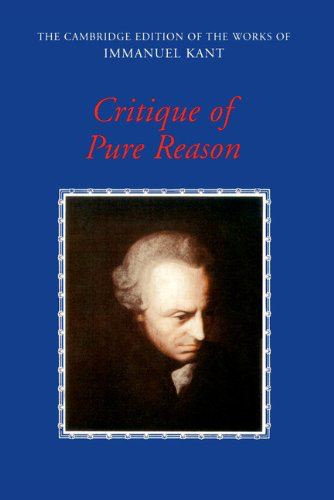
Kant Critique of Pure Reason
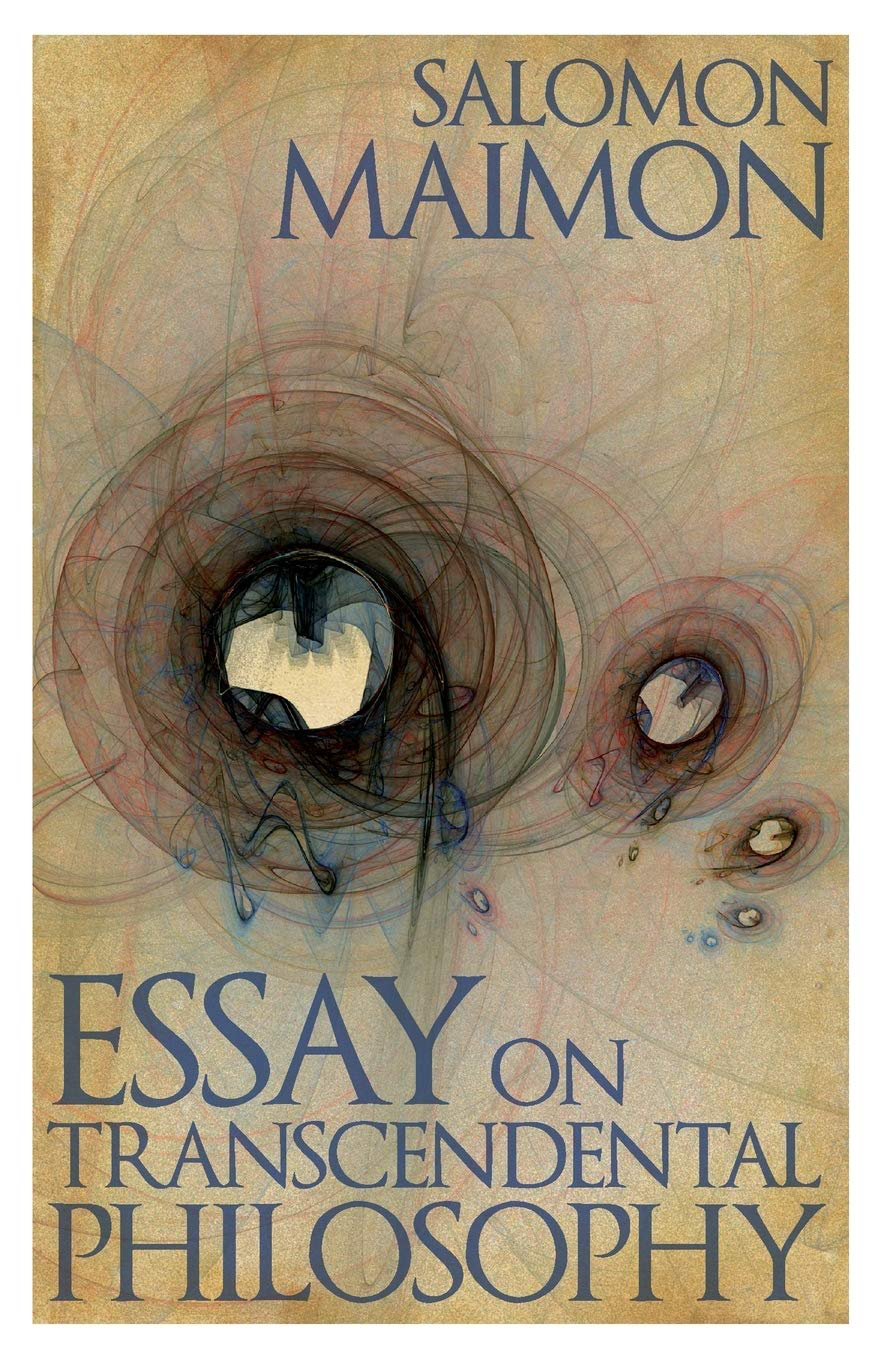
Maimon Essay on Transcendental Philosophy
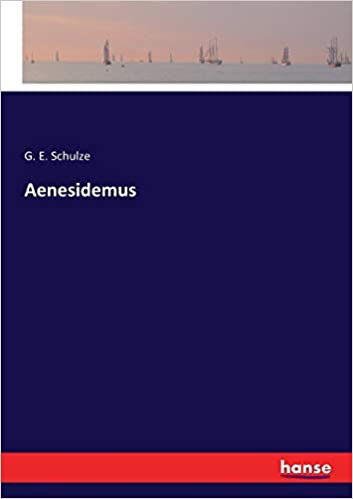
Schultz Aenesidemus

Jacobi Nachlass
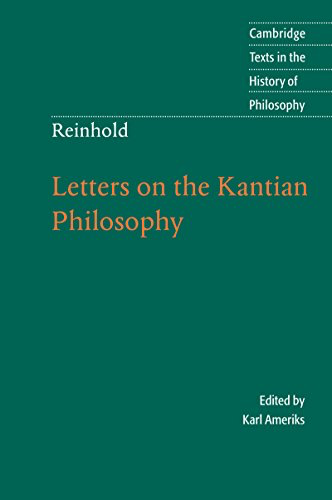
Reinhold Letters on Kant's Philosophy
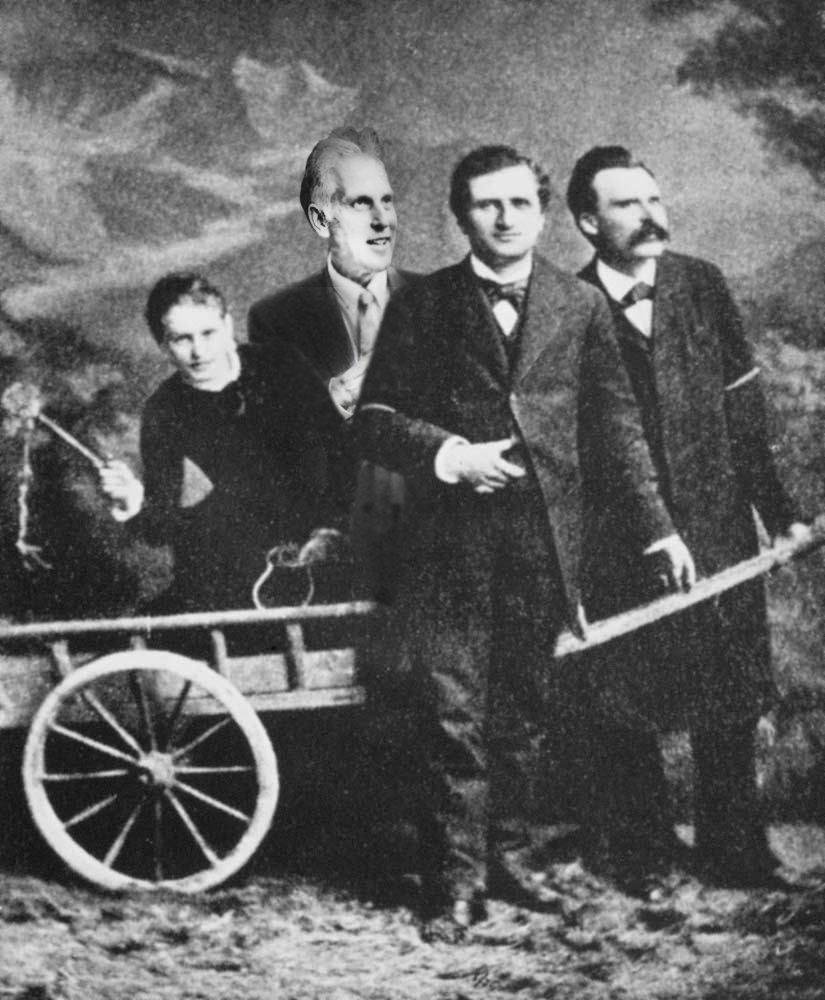
About the Author
Richard Marshall is still biding his time.